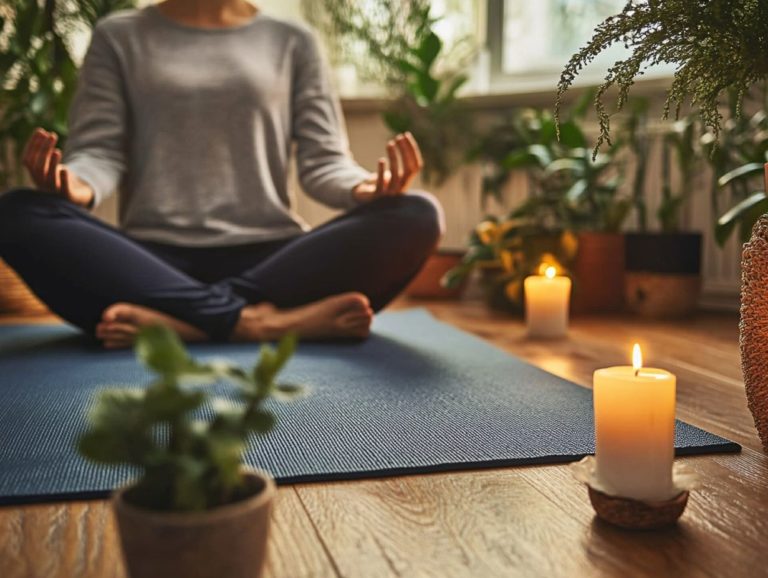Understanding the Neuroscience of Relaxation
In today s fast-paced world, discovering moments of calm can seem like a rare luxury. However, the science of relaxation underscores its vital role in both mental and physical well-being.
This article delves into the fascinating processes that unfold in your brain and body when you relax, highlighting the myriad benefits it brings. You ll find practical techniques, such as breathing exercises and mindfulness practices, which can be seamlessly woven into your daily routine.
Embrace relaxation not only as a means to nurture your health but also as a powerful catalyst for enhancing your productivity and focus.
Contents
- Key Takeaways:
- Unlocking the Secrets of Relaxation
- Benefits of Relaxation
- Techniques for Relaxation
- Incorporating Relaxation into Daily Life
- Understanding the Connection Between Relaxation and Productivity
- Frequently Asked Questions
- How does relaxation affect the brain?
- What are some examples of relaxation techniques?
- Can relaxation benefit overall health?
- How does chronic stress impact the brain?
- Are there any potential drawbacks to relaxation?
Key Takeaways:

- Relaxation offers both mental and physical benefits, reducing stress and boosting health.
- Practicing techniques like breathing exercises and meditation can enhance productivity and manage stress.
- Understanding how relaxation affects our brain shows its importance for well-being and performance.
Unlocking the Secrets of Relaxation
The science of relaxation reveals a profound connection between your mental state and physiological responses. Practices like meditation and mindfulness can significantly enhance your emotional regulation and diminish your stress response.
Neuroscience research underscores the transformative power of relaxation techniques. These techniques showcase their ability to reshape brain structure, improve health outcomes, and promote neuroplasticity, which is the brain’s ability to adapt and change.
Understanding this relationship allows you to use relaxation to manage stress and improve your well-being.
What Happens in the Brain and Body?
When you engage in relaxation techniques like mindfulness and meditation, you can expect notable changes in both your brain and body. This leads to an enhanced emotional response and greater body awareness.
Research studies and neuroimaging reveal that these practices significantly alter brain activity, promoting relaxation and reducing stress levels. For more insights, understanding the importance of relaxation can also strengthen communication channels between various brain regions.
Specifically, research indicates that mindfulness can decrease activity in the amygdala, the part of your brain responsible for processing fear and anxiety. At the same time, it boosts activation in areas related to self-awareness, such as the prefrontal cortex. These shifts facilitate improved emotional regulation, allowing you to navigate stressors with greater ease.
Studies using functional magnetic resonance imaging (fMRI) a technique that measures brain activity have shown that regular practitioners display increased connectivity between brain networks involved in attention and emotional processing. This suggests a deeper understanding of your internal states.
Such insights illuminate the physiological benefits of these techniques, contributing to a growing body of knowledge on the crucial role relaxation practices play in enhancing mental health.
Benefits of Relaxation
Relaxation isn t just about stress relief; it s your secret weapon for a better, healthier life! The benefits go far beyond simple stress relief; they significantly enhance both your physical and mental health.
By nurturing your emotional well-being and fostering cognitive flexibility, relaxation techniques can transform your daily experience. When you practice these techniques, you effectively lower your stress levels, cultivating a profound sense of calm and clarity.
This newfound tranquility enables you to navigate life s challenges with greater ease and effectiveness.
Start incorporating relaxation techniques into your daily life today and experience the difference!
Physical and Mental Health Benefits
Engaging in relaxation practices offers you profound physical and mental health benefits. These practices activate a natural state that helps reduce stress, enhancing your emotional regulation. Research highlights that regular meditation can lead to remarkable, lasting improvements in both physical health markers and mental resilience.
For instance, studies have shown that individuals who consistently practice mindfulness meditation experience a 30% reduction in stress levels, leading to better heart health. These techniques can help you achieve lower blood pressure, reduced anxiety, and an overall enhancement in well-being.
In fact, the American Psychological Association reported that over 60% of participants in mindfulness training experienced significant improvements in their emotional management skills.
By weaving these relaxation strategies into your daily routine, you can cultivate not just a more balanced emotional state but also pave the way for a healthier, more fulfilling lifestyle.
Techniques for Relaxation

Explore a variety of effective relaxation techniques, such as mindful breathing exercises, meditation practices, and progressive muscle relaxation.
Each of these methods serves as a powerful pathway to achieving a state of calm and overall well-being. By embracing the principles rooted in mindfulness, you can cultivate a sense of relaxation that seamlessly integrates into your daily life.
Breathing Exercises
Breathing exercises serve as a cornerstone for relaxation. They expertly manage your stress response while enhancing mindfulness and body awareness.
By honing in on breath control, you can regulate your emotional reactions and tap into how your body feels, cultivating a profound sense of calm.
These exercises offer a variety of techniques, from deep diaphragmatic breathing to structured methods like box breathing, where you inhale, hold, exhale, and pause for equal counts.
Engaging in controlled breathing helps lower cortisol levels, the notorious stress hormone. This results in a more relaxed heart rate and an overall sense of well-being.
Integrating mindfulness into your breathing practice keeps you anchored in the present moment. You can observe thoughts without judgment and aid emotional regulation.
To get started, find a quiet space, settle into a comfortable position, and focus on your breath. Gradually elongate your inhales and exhales, ushering in tranquility with each cycle.
Meditation and Mindfulness
Meditation and mindfulness are transformative practices that blend focused attention with emotional learning. They significantly enhance various cognitive domains.
By exploring different meditation techniques, you can cultivate self-awareness and improve your emotional regulation. This ultimately elevates your overall mental well-being.
Methods such as breath awareness, body scans, and loving-kindness meditation not only encourage relaxation but also foster cognitive flexibility. Regular engagement in these practices leads to substantial improvements in emotional intelligence and significantly reduces stress.
For instance, studies have shown that mindfulness training can reshape brain structures associated with self-awareness and emotional control, enabling you to respond more adaptively in challenging situations.
Integrating mindfulness into your daily routine provides a valuable tool for developing resilience. This allows you to navigate life s complexities with greater ease and grace.
Progressive Muscle Relaxation
Progressive muscle relaxation is an effective method designed to diminish your stress response. It does this by systematically tensing and relaxing muscle groups. This method not only enhances your body awareness but also promotes overall health. It encourages you to identify physical tension and release it, helping you feel calm.
By focusing on specific areas, you can learn to recognize where you tend to hold tension and consciously let it go. To practice this technique, begin by finding a comfortable position, whether seated or lying down. Start from your toes, tensing each muscle group for a few seconds before releasing, and work your way up through your body.
This practice also alleviates stress and improves your sleep quality. It reduces anxiety as well. When you combine it with techniques such as meditation or deep breathing, progressive muscle relaxation can significantly enhance your relaxation experience. Additionally, understanding the impact of music on relaxation creates a profound connection to your body awareness and overall well-being.
Incorporating Relaxation into Daily Life
Incorporating relaxation into your daily life is crucial for maintaining mental health and effectively managing stress. By weaving mindfulness practices and relaxation techniques into your everyday routines, you can establish enduring habits that foster emotional regulation. This enhances your overall well-being.
Tips for Finding Time and Making it a Habit

Finding time for relaxation and turning it into a habit can be a bit of a juggling act. However, with some straightforward strategies, you can simplify the process. This will reduce your stress levels while enhancing your overall well-being. By prioritizing mindfulness and setting specific goals, you can seamlessly weave relaxation into your daily routine.
Start by carving out dedicated time slots in your day, even if they re just brief moments. Use this time to indulge in peaceful activities like meditation, deep breathing, or gentle yoga. Consider using tools like planners or apps to track these moments; this will help you see how they transform into consistent routines.
Setting realistic goals is key. Just aiming for five minutes of mindfulness practice each day can lead to remarkable progress over time. Don t forget to celebrate those small victories along the way! These not only boost your motivation but also reinforce your commitment to a more relaxed lifestyle.
Understanding the Connection Between Relaxation and Productivity
Grasping the link between relaxation and productivity unveils how committed mindfulness practices can elevate your performance. This can enhance focus across various areas of your life.
By adeptly managing stress through relaxation techniques, you often find that your thinking skills sharpen and your emotional regulation improves. This ultimately leads to enhanced efficiency in everything you do.
How Relaxation Can Improve Performance and Focus
Relaxation techniques wield a remarkable influence on your performance and focus by alleviating stress and promoting mental clarity. By engaging in mindfulness practices, you can gain greater control over your cognitive functions. This paves the way for enhanced productivity and effective emotional regulation.
For example, a study from Harvard University revealed that dedicating just 10 minutes a day to meditation can significantly boost your attention span and cognitive flexibility. Techniques such as deep breathing and progressive muscle relaxation enable you to lower your heart rate and reduce cortisol levels. To learn more about these benefits, consider understanding the relaxation response, which directly contributes to diminished anxiety and improved concentration.
You can witness the practical applications of these techniques in corporate settings. Employees who embrace mindfulness often report better teamwork and elevated creative problem-solving. This cultivates a healthier work environment and propels greater overall success for the organization.
Frequently Asked Questions
What is the neuroscience of relaxation?
The neuroscience of relaxation studies how the brain and body work together to create calmness and reduce stress. It examines the physiological and psychological processes involved in relaxation.
How does relaxation affect the brain?

Relaxation techniques trigger the release of brain chemicals like dopamine and serotonin. These chemicals boost happiness and well-being while reducing stress hormones like cortisol, which can harm the brain and body.
What are some examples of relaxation techniques?
Curious about ways to relax? Here are some effective techniques:
- Deep breathing
- Progressive muscle relaxation
- Meditation
- Visualization
- Yoga
- Tai chi
- Massage therapy
Can relaxation benefit overall health?
Relaxation is linked to many health benefits! These include reduced anxiety and depression, improved sleep, lower blood pressure, and enhanced immune function. Regular relaxation practice can significantly improve your physical, mental, and emotional well-being.
How does chronic stress impact the brain?
Chronic stress negatively impacts the brain. It can lead to decreased cognitive function, memory issues, and even brain shrinkage. This stress can also contribute to mental health disorders like anxiety and depression.
Are there any potential drawbacks to relaxation?
While relaxation is generally beneficial, it may not suit everyone. Some individuals may struggle to relax or feel discomfort during relaxation techniques. Consulting a healthcare professional before starting new practices is always advisable.






